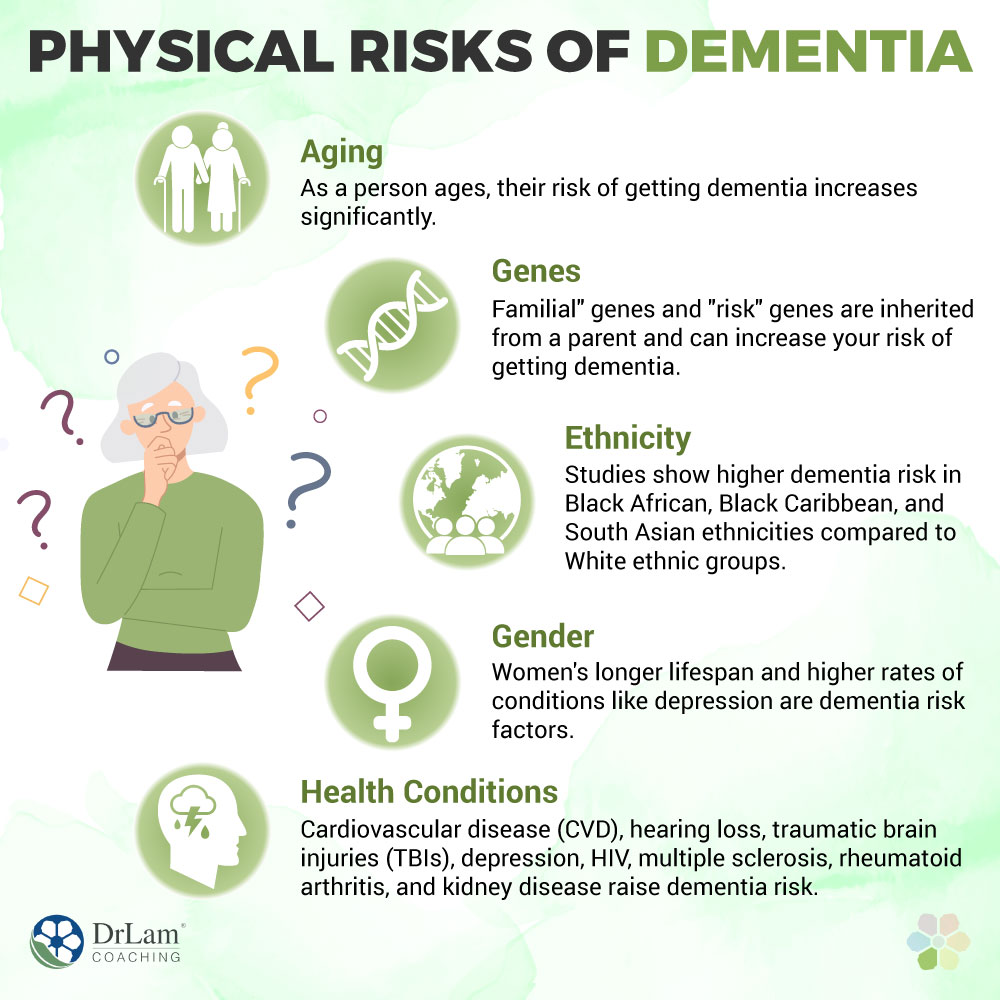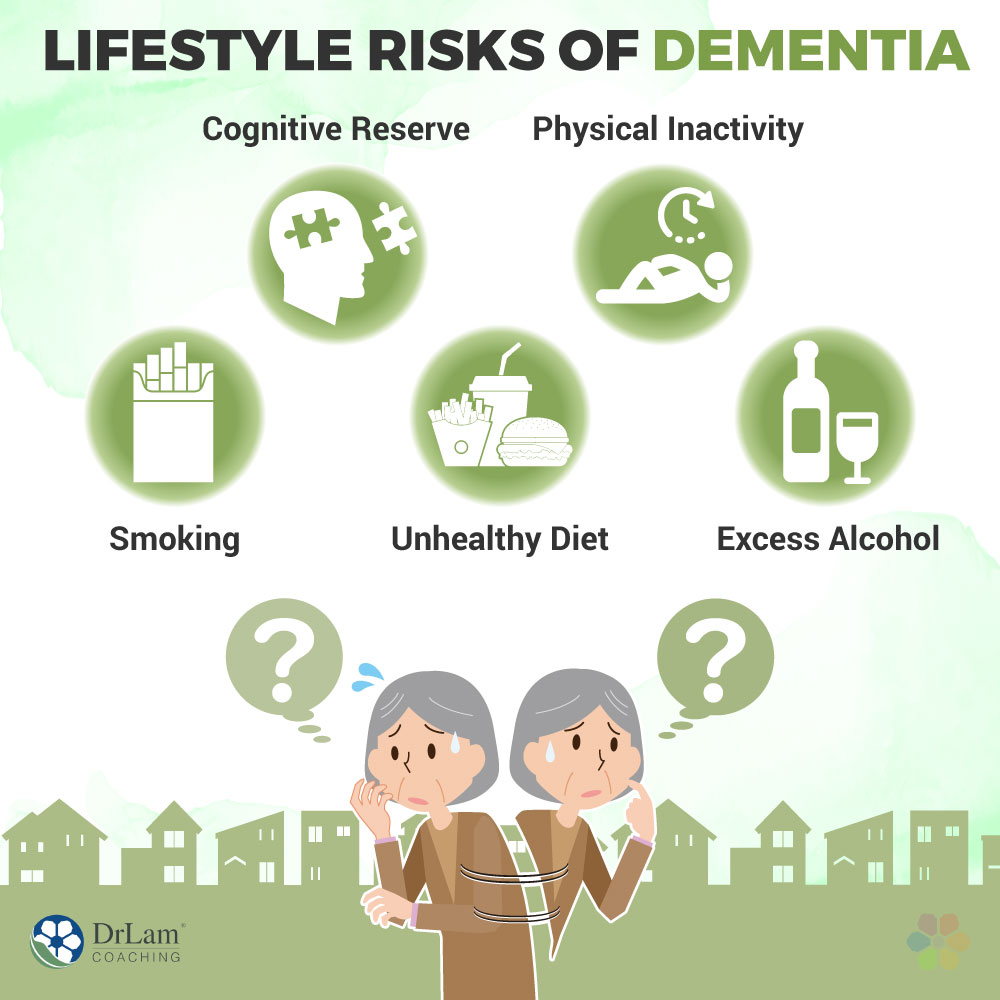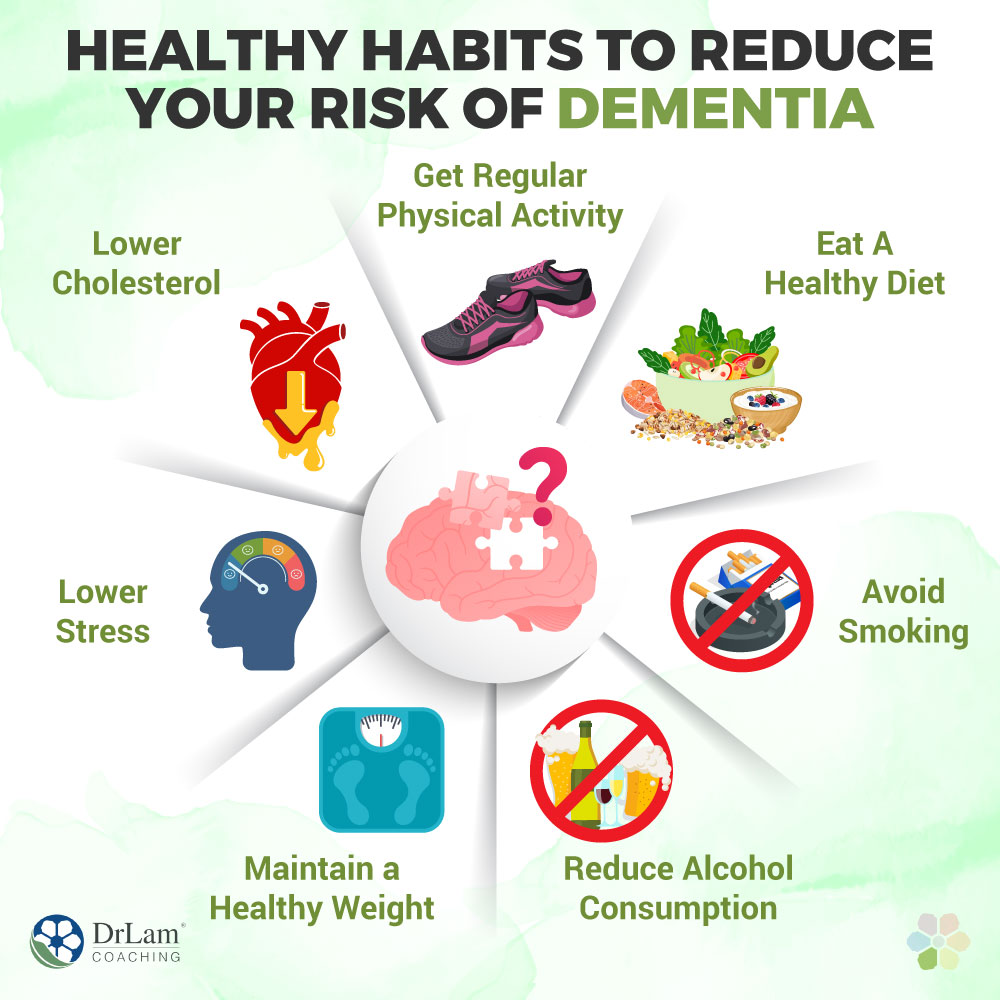 Dementia is the loss of cognitive functioning — thinking, remembering, and reasoning — to the degree that it interferes with your daily life and activities. Persons with dementia typically experience a decline in executive skills (like decision-making and organization), language skills, and visual-spatial skills. There are several risk factors, but there are also several ways to reduce your risk of dementia.
Dementia is the loss of cognitive functioning — thinking, remembering, and reasoning — to the degree that it interferes with your daily life and activities. Persons with dementia typically experience a decline in executive skills (like decision-making and organization), language skills, and visual-spatial skills. There are several risk factors, but there are also several ways to reduce your risk of dementia.
Of the things that are known to increase your chances of developing dementia, some can be controlled, while others are not things you can change. These factors include your age, genetics, diet, activity level, and any health conditions you may have.
As a person ages, their risk of getting dementia increases significantly. This is the most critical risk factor for dementia. Studies show that roughly 2 in every 100 persons, between 65 and 69 years of age develop dementia. As an individual ages, however, their risk for dementia increases. Specifically, the risk doubles with each five-year span of life. The longer you live, the more likely you are to get dementia.
Familial" genes and "risk" genes are inherited from a parent and can increase your risk of getting dementia. If a familial gene is passed from your parent to you, this will amount to you having a 1 in 2 chance of developing dementia. This tends to happen when individuals are in their 50s and 60s. Still, familial genes are rare and are not responsible for the most common types of dementia.
Risk genes increase an individual’s chances of developing dementia, but they don’t always lead to the development of dementia. Research shows that most of the known risk genes only increase your dementia risk slightly. However, the risk gene apolipoprotein E (APOE) can increase a person’s chance of getting dementia by up to four times.
Studies have indicated that persons from Black African, Black Caribbean, and South Asian ethnic backgrounds are at a higher risk of developing dementia when compared to persons from White ethnic groups. Further research findings indicate that people from Black ethnic groups have the highest risk of dementia. One suggested reason is for this that the ethnic groups identified have a higher likelihood of developing diabetes and cardiovascular disease (CVD), which are both crucial risk factors for dementia.
Certain health conditions increase your dementia risk. These include cardiovascular disease (CVD), hearing loss, traumatic brain injuries (TBIs), depression, and long-term medical conditions like HIV, multiple sclerosis, rheumatoid arthritis, and kidney disease.
Being female has been correlated with a higher risk of dementia. However, there are several related factors that could also explain this correlation, such as the fact that women typically live longer than men and are also diagnosed with higher rates of related conditions, like depression, that are themselves risk factors for dementia.

Your cognitive reserve is a measure determined by factors like how cognitively demanding your job is, whether you have creative hobbies, how active your social life is, and how high of an education level you have. A lower cognitive reserve is correlated with a greater risk of dementia. Individuals with a larger cognitive reserve tend to experience delayed dementia symptoms despite having some of the same physical signs of dementia as they age.
Physical inactivity negatively impacts the health of organs in your body like the heart and lungs and increases the risk of dementia.
 Smoking can damage your heart and lungs, as well as the blood vessels in the brain. This damage can lead to inflammation and prevent the adequate supply of oxygen to nerve cells. Furthermore, persons who smoke increase their risk of stroke, which has the potential to lead to vascular dementia.
Smoking can damage your heart and lungs, as well as the blood vessels in the brain. This damage can lead to inflammation and prevent the adequate supply of oxygen to nerve cells. Furthermore, persons who smoke increase their risk of stroke, which has the potential to lead to vascular dementia.
If your diet doesn’t contain nutrient-rich, healthy foods, you could be increasing your chance of getting dementia. Too much salt, sugar, and unhealthy fat in your diet can increase the risk of high blood pressure, heart disease, and diabetes, which are in turn associated with an increased risk of dementia.
An overconsumption of alcohol regularly can expose your brain to high levels of toxic substances that have the potential to damage nerve cells in the brain over time.

Although aging increases your risk of getting dementia, there are steps that you can take to decrease this risk. These habits can help keep your brain sharp long into your golden years.
One of the best ways to minimize your chance of getting dementia is to do regular physical activity. It is beneficial for your heart, blood circulation, weight maintenance, and mental health. You can participate in any physical activity that interests you, such as swimming, running, jogging, walking, playing tennis, and hiking.
A combination of aerobic and strength-building physical activities is ideal to keep your body and mind active. Incorporating movement into your day is also helpful, such as walking to the store, biking to work, or taking the stairs instead of the elevator.
However, it's best to consult with your healthcare provider before you begin any exercise routine. This is especially important for individuals with existing health conditions.
Making a healthy, balanced diet a part of your daily lifestyle could potentially reduce your chance of getting dementia. Research shows that a diet high in fruits, vegetables, and whole grains with limited amounts of red meat and sugar could help decrease a person's dementia risk.
Foods to include:
Avoid heavily salted foods, sugar, trans and saturated fats, red meat, and alcohol.
Smoking is bad for your health, harming blood circulation, especially the blood vessels in the brain, heart, and lungs. Research indicates that smoking increases cardiovascular risk factors that have been linked to increased chance of developing dementia. Your healthcare provider may suggest different methods to help quit smoking. Set a quit date, plan some strategies to help, and find a way to keep yourself accountable. If you need to join a support group to keep motivated, check online or the yellow pages for local support services.
Research shows that excessive alcohol consumption increases your risk of developing dementia. According to the National Institute on Alcohol Abuse and Alcoholism, even mild-to-moderate drinking can adversely affect cognitive functioning. If you do drink, do so in moderation according to the recommended limits for men and women. The American Dietary Guidelines recommend women limit their alcohol intake to one drink per day and men limit themselves to two drinks per day.
A recent study suggests that midlife obesity is a risk factor for dementia, and that brain changes in obese people mirror some of those with Alzheimer's. You can achieve and maintain a healthy weight by eating healthy, engaging in physical activity, getting optimal sleep, and reducing stress. See the diet and exercise guidelines above. Also, it is important to get adequate, quality rest for optimal weight. The recommended hours of sleep per day for an adult is seven hours or more a night. Reducing stress can also help your body maintain a healthy weight and keep your brain healthy.
 Additionally, stress can age the brain, so it's important to reduce stress. High levels of cortisol come with high levels of stress, but chronically high cortisol is characteristic of Adrenal Fatigue Syndrome (AFS) in the early stages and can lead to various health problems. Your body handles stress through NeuroEndoMetabolic (NEM) Stress Response, which distributes stress over six circuits of related organ systems. The Neuroaffect circuit of the NEM model comprises the brain, autonomic nervous system, and the microbiome. These can be greatly impacted by stress, leading to poor sleep, weight gain, brain fog, poor memory, and fatigue, all of which can contribute to your dementia risk.
Additionally, stress can age the brain, so it's important to reduce stress. High levels of cortisol come with high levels of stress, but chronically high cortisol is characteristic of Adrenal Fatigue Syndrome (AFS) in the early stages and can lead to various health problems. Your body handles stress through NeuroEndoMetabolic (NEM) Stress Response, which distributes stress over six circuits of related organ systems. The Neuroaffect circuit of the NEM model comprises the brain, autonomic nervous system, and the microbiome. These can be greatly impacted by stress, leading to poor sleep, weight gain, brain fog, poor memory, and fatigue, all of which can contribute to your dementia risk.
A recent study suggests that high blood cholesterol can increase the risk of certain types of dementia, like vascular dementia. As such, managing your cholesterol can help to keep dementia at bay. You can do so by eating a heart-healthy diet, exercising, not smoking, minimizing alcohol intake, and managing your weight.

Aging is the most critical risk factor for dementia, but certain healthy habits can help lower your risk of dementia. Eating a healthy diet high in fruits and vegetables, omega-3 foods, and whole grains may help, along with exercise, mental stimulation, maintaining a healthy weight, and getting adequate sleep. Lowering stress is also essential.
If you are concerned about dementia and would like assistance determining natural ways to prevent it, the team at Dr. Lam Coaching can help. We offer a free** no-obligation phone consultation at +1 (626) 571-1234 where we will privately discuss your symptoms and various options. You can also send us a question through our Ask The Doctor system by clicking here.
Stern, Y. (2012). Cognitive reserve in ageing and Alzheimer's disease. Lancet neurology 11 (11), 1006. https://doi.org/10.1016/S1474-4422(12)70191-6
Singh-Manoux, Archana et al. “Obesity trajectories and risk of dementia: 28 years of follow-up in the Whitehall II Study.” Alzheimer's & dementia : the journal of the Alzheimer's Association vol. 14,2 (2018): 178-186. doi:10.1016/j.jalz.2017.06.2637
Yuan, Qiuju et al. “Effects of Ginkgo biloba on dementia: An overview of systematic reviews.” Journal of ethnopharmacology vol. 195 (2017): 1-9. doi:10.1016/j.jep.2016.12.005
What is dementia? Symptoms, types, and diagnosis. National Institute of Health (2022). Accessed 11/05/2023, from https://www.nia.nih.gov/health/what-is-dementia
Abnormal cholesterol metabolism linked to dementia risk (2021), National Institutes of Health. Accessed 11/05/2023, from https://www.nia.nih.gov/news/abnormal-cholesterol-metabolism-linked-dementia-risk
You can reduce your risk of dementia by sticking to an active lifestyle, eating healthier, maintaining a healthy weight, lowering stress, limiting alcohol, not smoking, managing cholesterol, and maintaining healthy blood sugar.
